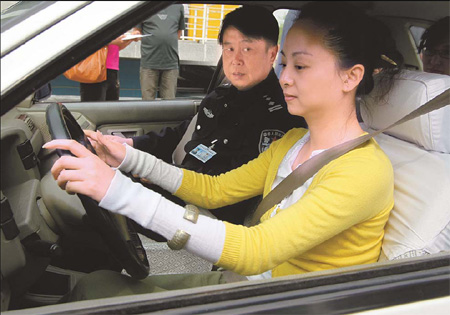Top Stories
First driving licenses for disabled
By Xu Fan (China Daily)
Updated: 2010-05-06 08:03
 |
Large Medium Small |
|
Tai Lihua, a deaf dancer, during her driving test. City police began to issue driving licenses for the disabled. [Wang Jing / China Daily] |
A married couple, who lost the use of their legs due to poliomyelitis, made history by being the first disabled people to receive driving licenses in Beijing.
Zhuang Li, 47, and his wife, Hao Tuo, 46, passed their driving test, following a change in regulations that came in on April 1.
They were among four people with disability who obtained their driving licenses in Beijing on Wednesday.
Under the regulations, five categories of disabled people can apply for driving licenses: those who have lost the use of their right leg, both their legs, right thumb, the tops of their fingers and those who are deaf or have lost most of their hearing, the Ministry of Public Security said.
Those who have lost the use of only their left leg can apply for driving licences as normal.
So far, about 600 disabled people have applied to take lessons in one of the two driving schools approved to teach people with disability: Beijing Oriental Fashion Automobile Driver School and Beijing Fengshun Driver School.
Zhuang, who contracted poliomyelitis when he was 10 months old and lost the use of both legs, has dreamed of driving for more than 20 years.
"I got up early this morning and came here with my wife," said Zhuang, who works for the Beijing Disabled Persons' Federation, while seated on a wheelchair.
Hao, who works at the China Rehabilitation Research Center, contracted poliomyelitis when she was one.
Hao said they started driving lessons on April 4 at Oriental driving school in suburban Daxing district.
The couple plans to buy a car and get it modified - at a cost of about 4,000 yuan - and drive it to Shanghai for the World Expo.
Hao said she is concerned there is not enough parking spaces for the disabled in Beijing and elsewhere.
Cars for people who can't use their legs will have their accelerator and brake controls moved to the handbrake lever.

The Oriental school has 12 modified cars. The school spent 4 million yuan on the modifications and on making their premises accessible for the disabled, including wheelchair passages and toilets.
After Zhuang and Hao passed their tests, a businessman Cai Xiuquan, 46, successfully completed his.
Cai, who also had poliomyelitis when he was a baby, has limited use of his legs, and was dependent on family members to get him around.
"I wanted to learn how to drive to be independent," he said.
The fourth was dancer Tai Lihua, who has been a deaf mute since she was two.
Tai, who had the lead role in the Thousand Arms Goddess of Mercy dance, said through a sign-language interpreter that learning to drive was an addition to her skills. She has no plan to buy a car.
Cai Hua, who tested the four applicants, said they drove "rather well" and were "like normal people".
Zhao Lijun, the couple's driving instructor, said all teachers of the disabled have to undergo two months of training in psychology and on how to train disabled drivers in the modified vehicles.
"Some disabled students have inferiority complexes so we should be more cautious while teaching them," he said.
Yan Wenhui, general manager the Oriental driving school, said the school almost earned "zero profit" from its 200 disabled students.
He said disabled students were charged 3,600 yuan each, a 15 percent discount off the fee for normal people.
"It has been still early to predict if it will be a large market to make profit," he said. "We focus more on taking an enterprise's social responsibility."
Yan said about 60 percent of the applicants can't use their legs, while 39 percent can't use their right legs. "Only seven applicants are deaf mutes," Yan said.








